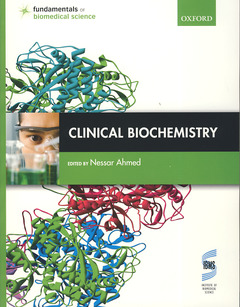Description
Clinical biochemistry (Fundamentals of biomedical science)
Authors: AHMED Nessar, SMITH Chris
Language: English
Subjects for Clinical biochemistry (Fundamentals of biomedical science):
Approximative price 51.94 €
In Print (Delivery period: 14 days).
Add to cart
Publication date: 06-2010
714 p. · 19x25 cm · Paperback
714 p. · 19x25 cm · Paperback
Description
/li>Contents
/li>
Biomedical scientists are the foundation of modern healthcare, from cancer screening to diagnosing HIV, from blood transfusion for surgery to food poisoning and infection control. Without biomedical scientists, the diagnosis of disease, the evaluation of the effectiveness of treatment, and research into the causes and cures of disease would not be possible. The Fundamentals of Biomedical Science series is written to reflect the challenges of practicing biomedical science today. It draws together essential basic science with insights into laboratory practice to show how an understanding of the biology of disease is coupled to the analytical approaches that lead to diagnosis. Assuming only a minimum of prior knowledge, the series reviews the full range of disciplines to which a Biomedical Scientist may be exposed - from microbiology to cytopathology to transfusion science. Alongside volumes exploring specific biomedical themes and related laboratory diagnosis, an overarching Biomedical Science Practice volume gives a grounding in the professional and experimental skills with which any Biomedical Scientist must be equipped. Clinical Biochemistry places the theoretical foundations of clinical biochemistry firmly in a practical environment. Written for students with a grounding in fundamental biochemical concepts, it demonstrates how the biomedical scientist applies these principles to key laboratory investigations. Providing a comprehensive overview of the discipline as applied to a wide range of diseases and disorders, and with coverage of laboratory automation and quality control, the text forges a clear link between science and practice.
1. Biochemical investigations and quality control. 2. Laboratory automation. 3. Renal failure. 4. Hyperuricaemia and gout. 5. Disorders of electrolyte balance. 6. Disorders of acid base balance. 7. Clinical enzymology. 8. Liver function tests. 9. Lipids. 10. Disorders of calcium homeostasis and bone. 11. Disorders of pituitary function. 12. Thyroid disease. 13. Diabetes mellitus and hypoglycaemia. 14. Disorders of the adrenal glands. 15. Disorders of reproductive endocrinology. 16. Investigation of nutrition. 17. Disorders of gastrointestinal tract. 18. Specific protein markers. 19. Cancer biochemistry and tumour markers. 20. Inherited and congenital disorders. 21. Therapeutic drug monitoring. 22. Chemical Toxicology.
© 2024 LAVOISIER S.A.S.




